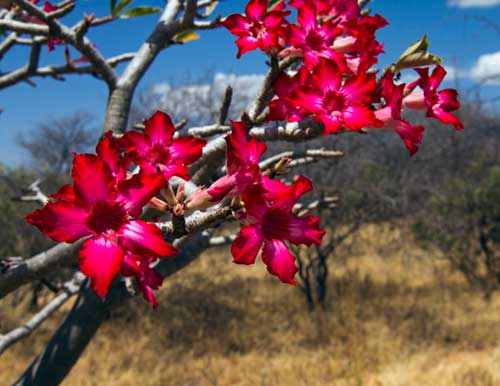Rejoicing in the Desert: or Rose Sunday
By Jody Stowell

KENYAN DESERT ROSE
Fast and Feast, Life in the Midst of Death
I wonder how your Lenten fast is going?
However you are experiencing Lent this year, we are coming to the middle of the Lenten season and are invited to take a pause in our fast this Sunday, with observance of the mid-fast Sunday: Laerete Sunday or Rose Sunday.
Coming from an Evangelical tradition, I have not found myself in churches where the tradition has lent itself to acknowledging the mid-fast practices of the Church calendar. However, I have always thought that part of ‘renewing the Evangelical centre’ is to notice where we might learn from other traditions of Christian spirituality, and Rose Sunday has a rather rich beauty to it which I would love to see enjoyed more widely.
The mid-fast practices which are seen in the more Catholic end of the Anglican spectrum are found in both Advent (with Gaudete Sunday) and Lent (Laerete or Rose Sunday). In both these seasons, the mid-fast practice is the Sunday which lies in the middle of the season (the 3rd Sunday of Advent or the 4th Sunday of Lent) and is there to lighten the restrictions of the fast. In some churches this has meant that flowers and song return to the church for that Sunday.
But the practice is much deeper and richer than the symbols that surround it. Laerete (and Gaudete) means to ‘Rejoice!’. In a period of fast, it is a way of reminding the spirit that, even in the fast, the feast is to come. Even in the Desert, the rains are coming. Even in Death, there will be Resurrection!
The name ‘Rose Sunday’ comes from the practice of wearing pink vestments that day (the same thing happens on Gaudete Sunday, and the Advent candle wreath often holds three purple candles and one pink candle to symbolise this Sunday). However, it made me think of the vital pink of the Desert Rose: a rose that springs up despite the lack of nutrients in its immediate vicinity; a rose that announces the tenacity of life, despite being surrounded by barren land.
If we explore this image, we can find some rich images which can nourish our own faith and spirituality, regardless of whether we find ourselves in the Desert or in a fertile and pleasant land.
Have you given up, taken up or opted out?
The Church calendar can be felt like a curse or a blessing.
We might find that, in our lives, we are in the midst of the Desert, but the Church calendar says we should be feasting, instead of fasting. Or it may be that our lives are dutifully obeying the ebb and flow of the Christian story throughout the year, or that the dissonance between the two is so painful that opting out is our only choice.
Observing the mid-fast practice offers a way along the cracked path that we might find ourselves walking. So that there is recognition that whatever ‘season’ we find ourselves in, we are reminded that there is a time for everything.
Our own practice throughout Lent can help us to keep in touch with the truth that our own life experience is not the only reality that needs to inform us. In my own Lenten practice I have found that when my life is following an even path, to remind myself of sacrifice and Desert, even if only in a small way, is to recall myself to the truth that my life and my experience are not the centre of reality, as important as they are. The same is true of the alternative practice of ‘taking up’ something which we consider a positive addition to our lives of faith: to proclaim in our practice that there can be abundance even if our life is experiencing a wilderness moment.
But even if our own Lenten practice is absent because the gap between life and Church calendar is simply too wide, or whether our life mirrors the season perfectly, Rose Sunday teaches us that in the midst of the Desert, then we are still called to ‘Rejoice!’. And Rose Sunday teaches us that when we are forced into the Desert by the Church calendar, even though we do not feel like it, that Easter contains a Cross as well as a Resurrection!
All these are elements that must be owned and inhabited in our Christian journey, and perhaps in our Lenten journey especially. There is Incarnation and all the messiness of life that goes with it. There are moments of joy where we know the love of God more deeply and hear the words ‘this is my child, who makes me very glad’. There are moments when, against those telling us otherwise, we must set our face towards actions that may look set to fail.
Rose Sunday teaches that, despite appearances, there is beauty in a barren land.
Rose Sunday tells us that there must be a Cross.
Rose Sunday tells us that there must be a Death.
And Rose Sunday proclaims that there will be a Resurrection.
May your Lent be blessed and your Easter glorious!
Jody is a Curate at All Saints’ Harrow Weald. She’s also a team member of Y2WB and is on National Committee of WATCH. jodystowell.com
